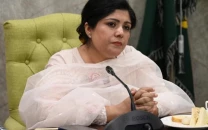Experts call for justice, culture, and ethics at heart of COP30 climate agenda
'Without embedding justice into climate policies, solutions risk perpetuating systemic inequalities'

Experts at a pre-COP30 dialogue in Karachi have urged the global community to recognise justice, culture, and ethics as essential pillars of climate action alongside technology and finance.
Naqsh, a women-led social impact consultancy, hosted Pakistan’s Global Ethical Stocktake (GES) Dialogue at the Faculty of Arts and Sciences, Aga Khan University, in collaboration with Project Dandelion and Climate REACH. The initiative, led by climate activist Ahmad Shabbar, formed part of the COP30 Presidency’s global call for informal dialogues contributing to the GES process.
The discussion focused on the moral, cultural, and justice dimensions of the climate crisis, exploring how ethical responsibility and local knowledge can inform global climate strategies.
“Without embedding justice into climate policies, solutions risk perpetuating systemic inequalities, undermining global cooperation and the moral imperative to act,” said Farwah Gulamali Khataw, Co-Founder and Chief Executive Officer of Naqsh.
She said climate justice requires addressing the disproportionate impacts of environmental degradation on marginalised communities, who often suffer the most from climate change despite contributing the least to its causes. Low-income nations and indigenous groups face rising sea levels, extreme weather and resource depletion, yet often lack the means to adapt. Ethical frameworks, she added, oblige wealthier countries to take responsibility for their historical emissions by ensuring equitable resource distribution and prioritising adaptation support for vulnerable populations.
“Culture shapes how societies perceive and respond to climate challenges, serving as a powerful catalyst for collective action,” said Saadia Khalid, Co-Founder and Chief Strategy & Engagement Officer of Naqsh. She noted that recognising diverse cultural perspectives at COP30 could bridge the gap between global policy and local reality. Indigenous knowledge, she said, provides time-tested approaches to sustainable land management, yet is often sidelined in favour of high-tech interventions.
Integrating cultural values into climate strategies — such as respect for communal land stewardship or traditional ecological wisdom — could make policies more relatable and effective within communities. Khalid warned that top-down interventions risk eroding cultural heritage and alienating the very populations essential for long-term environmental resilience.
“Ethics must guide the deployment of technology and finance to ensure climate action aligns with human dignity and planetary boundaries,” said Zareen Zahid Qureshi, Co-Founder and Chief Impact Officer of Naqsh. She urged that COP30 deliberations consider the moral implications of measures such as geoengineering and carbon markets, which can prioritise short-term economic gains over long-term sustainability or exacerbate inequality.
An ethical approach, Qureshi said, demands transparency, accountability and inclusive decision-making, ensuring that financial mechanisms such as green bonds and climate funds favour community-led projects over corporate profit. By placing justice, culture and ethics alongside technology and finance, COP30 could take a more holistic approach to building a fair and sustainable global response to climate change.
“This Stocktake is an opportunity for us in Pakistan to show that we are not just victims of the climate crisis but leaders and co-creators of climate strategy — people with wisdom and resilience on the frontlines of environmental defence,” said Khataw.





















COMMENTS
Comments are moderated and generally will be posted if they are on-topic and not abusive.
For more information, please see our Comments FAQ